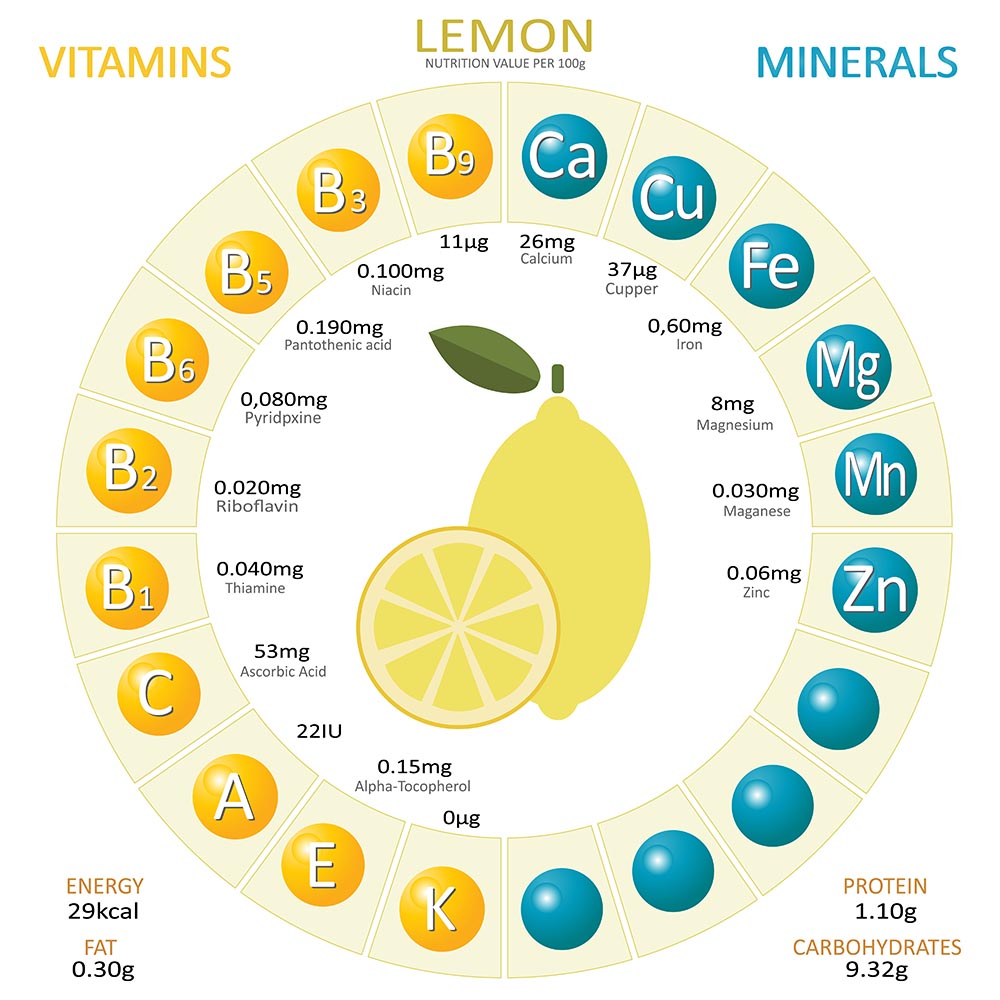Lemons are a type of citrus fruit that has an intensely sour flavor. This fruit is generally not eaten as is because of its strong taste but is instead used in combination with spices and herbs in cooking, or in desserts and drinks. But can dogs eat lemons, or are lemons bad for dogs?
If you've been wondering, “can dogs have lemon,” the answer is – YES, dogs can eat lemons technically because in very small amounts they're not toxic to them. However, because of how acidic this fruit it, only extremely small amount of lemon (or lemon juice itself) can be given to dogs. Also, we should question whether lemons are even needed for dogs and if there's any reason to give dog a lemon to eat.
Lemons is a nutritionally powerful fruit and provides many health benefits for people. But the amounts in which can dogs have lemons differ significantly, and in this article we'll look at what happens when dog eats lemon whole, are lemons bad for dogs in any instance, can dogs eat lemons on a regular basis and more.
ALSO READ: 6 Fruits Dogs Can Eat and Probably Should (According to Studies)
What are lemons?
Lemon is a yellow citrus fruit from the lemon tree, and the juice from this fruit is frequently used in food and drinks. In particular, the rind and pulp are used in baking and cooking. Its distinctive sour taste is also a key ingredient for foods and drink such as lemon meringue pie and lemonade.
There are multiple varieties of lemons, and they are heralded for their large quantity of Vitamin C. They also have heavy concentrations of citric acid and phytochemicals. Lemons are also used as cleaning agents and for aromatherapy purposes which makes them very effective due to their high acidity levels.
This is what fresh lemons look like:

Other than making tasty drinks and foods, lemons have also been used by people for medicinal or nutritional reasons. There's plenty of research support the many benefits of lemons for humans, but can dogs eat lemons and reap the same benefits? Is there any evidence on using lemons for dogs, can dogs have lemons in any form, or are lemons bad for dogs in any cases? let's take a closer look.
RELATED: Can Dogs Eat Plums?
Lemons for Dogs 101
Can Dogs Eat Lemons?
 Can dogs eat lemons the same way humans can? Technically yes, you can give your dog lemon. But because too much of lemon juice from the lemon can have a toxic effect due to high acidity, essential oils and psoralens, you need to be careful with the amount that you feed your dog.
Can dogs eat lemons the same way humans can? Technically yes, you can give your dog lemon. But because too much of lemon juice from the lemon can have a toxic effect due to high acidity, essential oils and psoralens, you need to be careful with the amount that you feed your dog.
The most significant concern of feeding lemons to dogs is the acidic values in this fruit which can cause gastrointestinal upset in dogs, including vomiting and diarrhea. Although generally, a dog needs to consume lemons in larger quantities to get to this point.
But should you give your dog lemons?
Unfortunately, there hasn't been any studies done with canines that would show any benefits of feeding lemons to dogs. So while technically a small serving of lemons may be safe for dogs, we don't know of any reasons currently to give your pets lemons. In fact, UK's animal welfare organization RSPCA have issued warnings about feeding lemons to dogs for pet owners who've been making videos. Their claims may be slightly exaggerated since it's the amount that matters, but concerns are valid nonetheless.
One may suspect that it's possible that certain health benefits of feeding lemons to dogs would apply as they often do when looking at other fruits – blueberries and apples, for example. People and dogs often share some health benefits of fruits, so let's take a look at what studies show in clinical trials with humans and mice on the benefits of lemons.
- Lemons support heart health and lower cholesterol (1, 2, 3, 4, 5, 6)
- Lemons may prevent kidney stones (7, 8, 9, 10)
- Lemons may have anti-cancer properties (11, 12, 13, 14, 15, 16)
- Lemons may prevent anemia by improving iron absorption (17, 18)
- Lemons may help prevent weight gain (19, 20, 21)
Those are just some of the benefits of lemons for people (and mice), but none of those have been tested in dogs, thus we cannot know for certain whether any of these health benefits would apply to them. It's certainly possible.
Can dogs have lemon juice?
 One might wonder, if lemons are not bad for dogs in small amounts, can dogs have lemon juice as well? The answer to that is NO – dogs should not be drinking lemon juice in any amounts. Lemon juice is a high acidity concentrate with absolutely no benefits to dogs, and is very likely to cause stomach upset or other GI related issues in canines.
One might wonder, if lemons are not bad for dogs in small amounts, can dogs have lemon juice as well? The answer to that is NO – dogs should not be drinking lemon juice in any amounts. Lemon juice is a high acidity concentrate with absolutely no benefits to dogs, and is very likely to cause stomach upset or other GI related issues in canines.
A whole lemon will have fiber that helps to balance out the natural sugars and acidity. This makes the lemon itself safer to dogs than lemon juice. Bottom line is there's no reason to give lemon juice to dogs. The same applies to giving lemon water to dogs.
With that being said, can dogs have lemons (whole) and reap some of the benefits? We don't know for sure, but we can assume that some of these proven benefits found in humans and mice may stretch to dogs. This is relevant since small amounts of lemons for dogs are safe, so here are some potential benefits that are not yet proven in any way.
7 Potential Benefits of Lemons for Dogs
1. Lemons may provide relief from arthritis pain in dogs.
Although lemons are acidic, they have an alkalizing effect when in the body itself. This alkalizing effect balances the pH levels in the body, reducing the inflammation and relieving the pain associated with arthritis. This was seen in humans but we're not sure if this actually would work in dogs, and it remains to be seen.
2. Lemons may help fight and reduce the risk of cancer in dogs.
Lemons are full of Vitamin C, a powerful antioxidant that protects a dog’s cells from free radical damage. The cells that are damaged by free radicals are the first step in the development of cancer, and adding Vitamin C to your diet may prevent cancer altogether. Lemons contain flavonol glycosides and limonene, two cancer-fighting antioxidants amongst the twenty-two that are found in this fruit.
3. Lemons may be used to prevent ear infections in dogs.
Ear infections are one of the most common health problems encountered in dogs, and the number one reason pet owners visit a veterinarian. Using a natural remedy like a lemon flush in the ears may prevent future ear infections from occurring due to its acidity. It’s particularly useful for dogs who swim on a frequent basis. However, this needs to be discussed with a vet and you should never attempt to do this without vet supervision.
4. Lemons assist in the absorption of critical nutrients.
Not only does lemon have a high concentration of Vitamin C, but it also has Vitamin B3, Vitamin E, selenium, and potassium. Each of these vitamins and minerals – and especially Vitamin C – work to help the dog’s body absorb nutrients more efficiently which causes body functions to run normally. This is particularly the case for iron absorption which, in human trials with consuming lemons, was shown to help prevent anemia.
5. Lemons may help stimulate weight loss in dogs.
Lemons have a lot of pectin fiber which stops hunger pains from occurring. Additionally, studies have shown some weight loss associated with alkaline diets, and because of the alkaline content within lemons, this fruit may be used as a means to help your dog shed some extra pounds as was observed in studies with people and mice.
6. Lemons may promote strong teeth and bones.
The high quantity of Vitamin C in lemons may help a dog’s body to absorb and metabolize calcium, strengthening teeth and bones. Also, a diet high in Vitamin C is likely to promote a less than friendly environment for bacteria to grow and thrive (as is true for cancers), especially in the mouth, effectively washing away bacteria and plaque.
7. Lemons may help eradicate dog acne.
Some puppies and dogs of certain breeds, such as Dobermans, Rottweilers, and Boxers, are prone to developing acne on their lips or chin. Using lemon with green tea to dab gently on the acne may help to fight off this skin condition, but this needs to be discussed with a veterinarian and done under vet's supervision.
So, can dogs have lemons?
The bottom line here is that while yes, dogs can eat lemons, we aren't sure of any proven benefits of feeding this fruit to our dogs. It's possible that some of the proven benefits of lemons in mice and people can be applied to dogs, but this remains to be seen. If you want to feed your dog a few slices of lemon, it's totally fine and it should not upset your dog's stomach or have any other issues. But we don't know yet if there's a reason to feed this fruit to dogs at all.
RELATED: Can Dogs Eat Cake?
3 Side Effects of Lemons for Dogs
Are lemons bad for dogs in any instances? Yes, absolutely – they can be dangerous to dogs when consumed in larger quantities, or for dogs with certain health conditions. Here are some of the possible side effects of feeding dogs lemons.
1. Too many lemons may lead to psoralens toxicity in dogs.
The acidic citrus levels in lemons are often too much for some dogs to even taste, but there are also some dogs who will eat anything they can get their mouths on, no matter how sour or bitter the taste. Too much citrus may develop into psoralens toxicity. If your dog has ingested a lot of lemons, look for these symptoms of toxicosis:
- Gastrointestinal distress (vomiting, diarrhea)
- Muscle tremors
- Excessive drooling
- Inability to stand or walk
- Rashes in the groin area
- Liver failure
2. Lemon peels, seeds and plant can be very dangerous for dogs.
While the whole lemon fruit may be safe to dogs in small amounts, the peel or skin of lemon is a severe choking hazard, primarily but not exclusively for smaller breed dogs. A large piece of peel can easily obstruct the gastrointestinal tract. The lemon plant itself can also be toxic to dogs.
While a lemon seeds aren’t dangerous to dogs in terms of their content, they can irritate the digestive system of any dog with gastrointestinal disorders such as irritable bowel syndrome, and otherwise become a choking hazard for dogs.
3. Lemon juice is not appropriate for dogs.
The acidity in lemon juice can cause severe stomach upset, including vomiting and diarrhea. You should not give your dog lemon juice for any reason.
Summary
Can Dogs Eat Lemons?
 So can dogs eat lemons safely? In small amounts – yes, you can give your pooch a few slices of whole lemon. But while dogs can eat lemons, it’s generally not encouraged unless carefully monitored for amount, and even then we must question the reason why would anyone given a dog lemon.
So can dogs eat lemons safely? In small amounts – yes, you can give your pooch a few slices of whole lemon. But while dogs can eat lemons, it’s generally not encouraged unless carefully monitored for amount, and even then we must question the reason why would anyone given a dog lemon.
Most dogs won’t enjoy the taste of lemons anyway. We also aren't sure if there's any real benefits from feeding lemons to dogs, even if studies with mice and people demonstrate them. Finally, you should never give your dog lemon juice and in generally, maybe stick to safer and actually beneficial fruits (like banana or raspberries) that are good for dogs, or any other human foods that are proven healthy to canines.
READ NEXT: 16 Healthy Human Foods for Dogs (That You Haven’t Thought Of)














